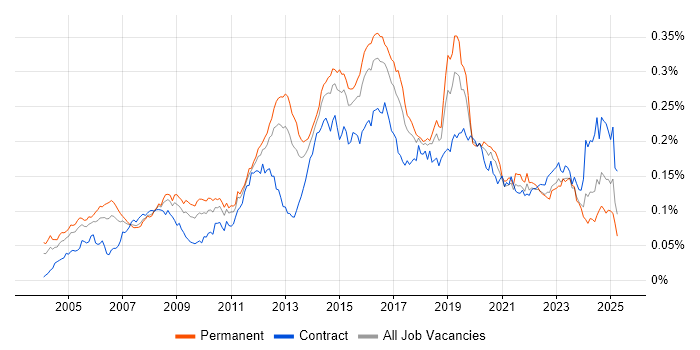Network Security Engineer
UK > England
The median Network Security Engineer salary in England is £47,500 per year, according to job vacancies posted during the 6 months leading to 27 February 2026.
The table below compares current salary benchmarking and summary statistics with the previous two years.
| 6 months to 27 Feb 2026 |
Same period 2025 | Same period 2024 | |
|---|---|---|---|
| Rank | 627 | 595 | 718 |
| Rank change year-on-year | -32 | +123 | +156 |
| Permanent jobs requiring a Network Security Engineer | 18 | 63 | 50 |
| As % of all permanent jobs in England | 0.029% | 0.15% | 0.075% |
| As % of the Job Titles category | 0.032% | 0.16% | 0.079% |
| Number of salaries quoted | 16 | 52 | 47 |
| 10th Percentile | - | £50,125 | £37,463 |
| 25th Percentile | £45,000 | £51,500 | £51,250 |
| Median annual salary (50th Percentile) | £47,500 | £55,000 | £60,000 |
| Median % change year-on-year | -13.64% | -8.33% | -8.05% |
| 75th Percentile | £59,063 | £60,313 | £88,750 |
| 90th Percentile | £79,375 | £72,000 | £115,000 |
| UK median annual salary | £47,500 | £55,000 | £60,000 |
| % change year-on-year | -13.64% | -8.33% | -7.69% |
All Permanent IT Job Roles
England
For comparison with the information above, the following table provides summary statistics for all permanent IT job vacancies in England. Most job vacancies include a discernible job title that can be normalized. As such, the figures in the second row provide an indication of the number of permanent jobs in our overall sample.
| Permanent vacancies in England with a recognized job title | 56,291 | 38,834 | 63,155 |
| % of permanent jobs with a recognized job title | 91.48% | 91.14% | 94.57% |
| Number of salaries quoted | 36,358 | 21,086 | 50,364 |
| 10th Percentile | £29,500 | £32,500 | £29,000 |
| 25th Percentile | £38,750 | £45,000 | £39,750 |
| Median annual salary (50th Percentile) | £55,000 | £60,000 | £55,000 |
| Median % change year-on-year | -8.33% | +9.09% | -10.57% |
| 75th Percentile | £75,000 | £80,000 | £75,000 |
| 90th Percentile | £95,000 | £100,000 | £95,000 |
| UK median annual salary | £55,000 | £60,000 | £55,000 |
| % change year-on-year | -8.33% | +9.09% | -8.33% |
Network Security Engineer
Job Vacancy Trend in England
Historical trend showing the proportion of permanent IT job postings featuring 'Network Security Engineer' in the job title relative to all permanent IT jobs advertised in England.

Network Security Engineer
Salary Trend in England
Salary distribution trend for Network Security Engineer job vacancies in England.

Network Security Engineer
Salary Histogram in England
Salary distribution for jobs citing Network Security Engineer in England over the 6 months to 27 February 2026.
Network Security Engineer
Job Locations in England
The table below looks at the demand and provides a guide to the median salaries quoted in IT jobs citing Network Security Engineer within the England region over the 6 months to 27 February 2026. The 'Rank Change' column provides an indication of the change in demand within each location based on the same 6 month period last year.
| Location | Rank Change on Same Period Last Year |
Matching Permanent IT Job Ads |
Median Salary Past 6 Months |
Median Salary % Change on Same Period Last Year |
Live Jobs |
|---|---|---|---|---|---|
| North West | +3 | 7 | £45,000 | -15.49% | 3 |
| North of England | -9 | 7 | £45,000 | -18.74% | 5 |
| London | +22 | 4 | £80,000 | +23.08% | 2 |
| East of England | +9 | 3 | £55,000 | -15.38% | 2 |
| West Midlands | +12 | 2 | £60,000 | +25.00% | 7 |
| Midlands | -3 | 2 | £60,000 | +25.00% | 9 |
| South West | -4 | 1 | £60,000 | -7.69% | 7 |
| South East | -41 | 1 | - | - | 1 |
| Network Security Engineer UK |
|||||
Network Security Engineer Skill Set
Top 30 Co-Occurring Skills & Capabilities in England
For the 6 months to 27 February 2026, Network Security Engineer job roles required the following skills and capabilities in order of popularity. The figures indicate the absolute number of co-occurrences and as a proportion of all permanent job ads across the England region featuring Network Security Engineer in the job title.
|
|
Network Security Engineer Skill Set
Co-Occurring Skills & Capabilities in England by Category
The following tables expand on the one above by listing co-occurrences grouped by category. They cover the same employment type, locality and period, with up to 20 co-occurrences shown in each category:
|
|
||||||||||||||||||||||||||||||||||||||||||||||||||||||||||||||||||||||||||||||||||||
|
|
||||||||||||||||||||||||||||||||||||||||||||||||||||||||||||||||||||||||||||||||||||
|
|
||||||||||||||||||||||||||||||||||||||||||||||||||||||||||||||||||||||||||||||||||||
|
|
||||||||||||||||||||||||||||||||||||||||||||||||||||||||||||||||||||||||||||||||||||
|
|
||||||||||||||||||||||||||||||||||||||||||||||||||||||||||||||||||||||||||||||||||||
|
|
||||||||||||||||||||||||||||||||||||||||||||||||||||||||||||||||||||||||||||||||||||
|
|||||||||||||||||||||||||||||||||||||||||||||||||||||||||||||||||||||||||||||||||||||
